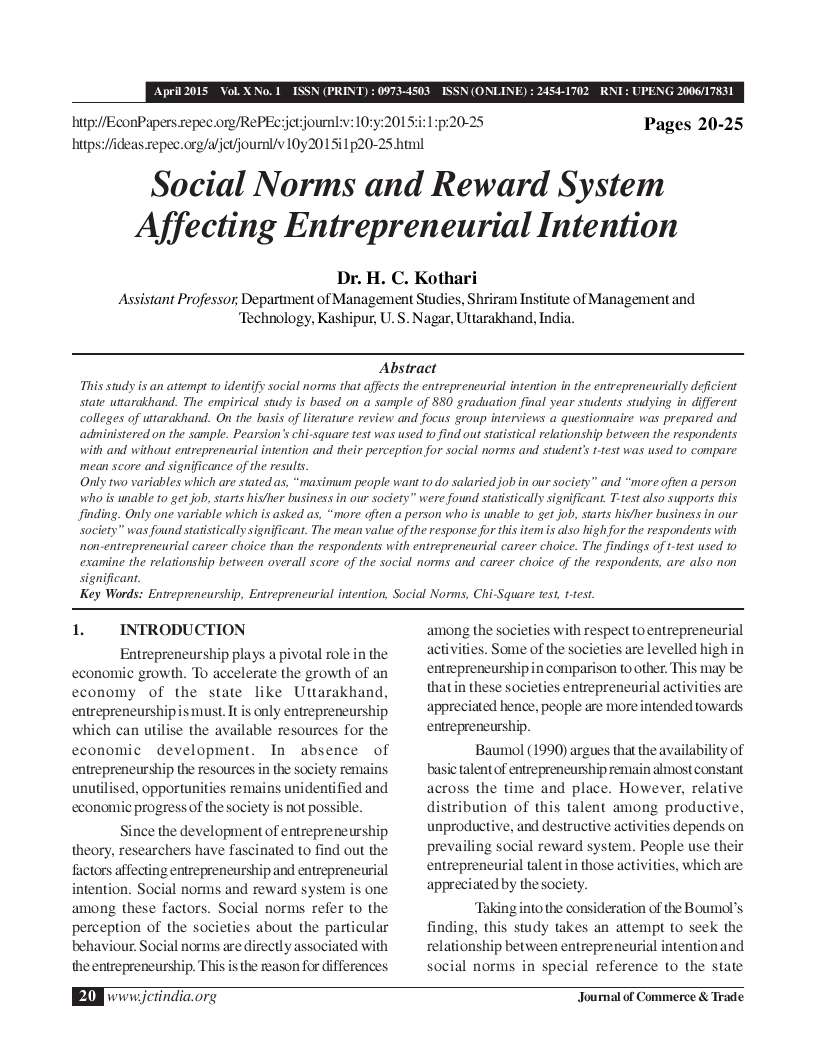Social Norms and Reward System Affecting Entrepreneurial Intention
DOI:
https://doi.org/10.26703/jct.v10i1.193Keywords:
Entrepreneurship, Entrepreneurial Intention, Social Norms, Chi-Square Test, T-TestAbstract
This study is an attempt to identify social norms that affects the entrepreneurial intention in the entrepreneurially deficient
state uttarakhand. The empirical study is based on a sample of 880 graduation final year students studying in different
colleges of uttarakhand. On the basis of literature review and focus group interviews a questionnaire was prepared and
administered on the sample. Pearsion’s chi-square test was used to find out statistical relationship between the respondents
with and without entrepreneurial intention and their perception for social norms and student’s t-test was used to compare
mean score and significance of the results. Only two variables which are stated as, “maximum people want to do salaried job in our society” and “more often a person who is unable to get job, starts his/her business in our society” were found statistically significant. T-test also supports this finding. Only one variable which is asked as, “more often a person who is unable to get job, starts his/her business in our society” was found statistically significant. The mean value of the response for this item is also high for the respondents with non-entrepreneurial career choice than the respondents with entrepreneurial career choice. The findings of t-test used to examine the relationship between overall score of the social norms and career choice of the respondents, are also non
significant.
Downloads
Metrics
References
Ajzen, I. (1985). From intentions to actions: a theory of planned behavior. Action Control From cognition
to behaviour ed by J. Kuhl and J. Beckmann pp. 11-39. Springer-Verlag.
Ajzen, I. and Fishbain, M. (1980). Understanding Attitude and Predicting Social Behaviour. Englewood
Cliffs, Prentice Hall.
Aris, S. (1970). The Jews in Business. London: Jonathan Cape.
Axelrod R. (1986). An evolutionary approach to norms. American Political Science Review, vol 80 (4),
pp 1095-1111.
Baumol, W. J. (1990). Entrepreneurship- Productive, Unproductive and Destructive. Journal of Political
Economy, vol 98 (5), pp 893-921.
Berkowitz, L. (1972). Social norms, feelings and other factors affecting helping and altruism. Advances
in Experimental Social Psychology, vol 6, pp 63-108.
Birley, S. J. (1985).The Role of Networks in the Entrepreneurial Process. Journal of Business Venturing,
vol 1 (1), pp 107-117.
Burt, R. (1992). The Social Structure of Competition, in Nitkin, N. and Eccler, R. (eds.), Networks and
Organisational Structure, Firm and Action, Bosbon, MA: Harvard Business School Press.
Chell, E. (1988). Explorations of the entrepreneurial Personality: A Latent Class Analysis, Paper Presented
at the Second International Workshop on Recent Research on Entrepreneurship, Vienna: The University
of Economics. (Quoted by Manimala, 1999).
Cochran, T. C. (1965). The Entrepreneur in Economic Change. Exploration in Entrepreneurial History,
Vol 3 (1), pp 25-38.
Coleman J. S. (1990). Foundations of social theory. The Belknap Press of Harvard University Press.
Fishbein, M. And Ajzen, I. (1975). Belief, Attitude, Intention and Behaviour: An Introduction to Theory
and Research, Reading, M A. Addition- Wesley.
Gadgil, D. R. (1959). Origins of the Modern Indian Business Class: An Interim Report, New York,
Institute of Pacific Relations.
Granovetter, M. (1973). The Strength of Week Ties. American Journal of Sociology, vol 78, pp 1360-
Guha, A. (1970). Parsi Seths and Entrepreneurs: 1750-1850, Economics and Political Weekly, vol 5 (35),
pp 107-115.
Hagen, E. E. (1962). On the Theory of Social Change. Bombay: Vakil/Irwin.
Hechter M. and Borland, E. (2001). National self-determination: the emergence of an international norm.
Social Norms. pp. 186-233, Russell Sage Foundation New York.
Hills, G.; Lumpkin, G.; and Singh, R. (1997). Opportunity Recognition: Perception and Behaviour of
Entrepreneurs, in Reynolds, P. D. Bygrave, W. O.; Devidson, P.; Grtner, W. B.; Mason, C. M.; McDougall
P. P. (eds.). Frontiers of Entrepreneurship Research, Wellesley, MA: Babson College, pp 168-182.
Hozelitz, B. (1960). Sociological Aspect of Economic Growth, London: Collier McMillan.
Keefer P. and S. Knack (2006). Social capital, social norms and the institutional economics. World Bank
Policy Research Reports. Available at http://siteresources.worldbank.org/INTINVTCLI/Resources/
socialcapitalsocialnorms.pdf
Kulke, E. (1974). The Process in India: A minority as Agent of Social Change, New Delhi, Vikas
Publication House.
Ortgard, T. and Birley, S. (1994). New Venture Growth and Personal Network. Journal of Business
Research, vol 36, pp 37-60.

Additional Files
Published
How to Cite
Issue
Section
License
Copyright (c) 2015 Journal of Commerce and Trade

This work is licensed under a Creative Commons Attribution 4.0 International License.







